LATEST NEWS
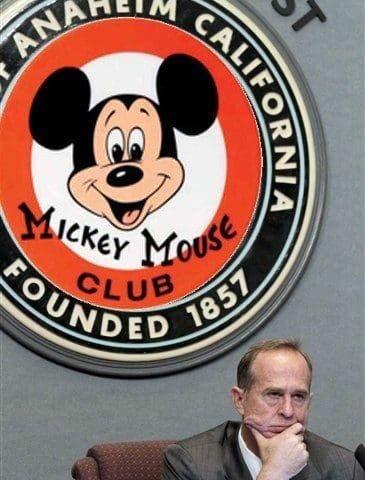
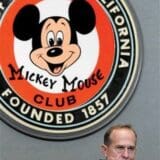
New headlines have emerged almost daily in the explosive weeks following the death of Manuel Diaz, who was unarmed when Anaheim police shot him on July 21st.The night after Diaz’s death, police shot and killed Joel Acevedo — the fifth fatal officer-involved shooting in Anaheim this year. A city council meeting set for Wednesday afternoon (August 8th) at Anaheim High School’s 1,300 seat auditorium is expected to be overflowing. The mayor, the police chief, angry residents—all make the news reports.
But Anaheim’s most high-profile denizen has stayed out of the spot light. “The Mouse”– Disneyland and Disney Corporation – has wisely avoided taking a high-profile stand that would mix the Disney brand with news of conflict and racial strife in Anaheim, where tourism is king.
While Disney doesn’t govern police policy (although some residents argue to the contrary, citing Disney’s influence in the city), The Mouse does unquestionably wield major influence in shaping Anaheim’s economic development gestalt,

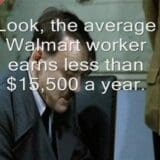
On the heels of Walmart’s 50th birthday, several writers have examined the outsized wealth accumulated by six members of the Walton family, the clan that exercises controlling interest over the retail giant. The University of Californian, Berkeley’s Sylvia Allegretto, for example, has written that even as their fellow members of the Forbes 400 club lost wealth between 2007 and 2010, the Walton heirs actually accumulated more.
Meanwhile, Josh Bivens of the Economic Policy Institute notes the Walton family wealth is now “as large the bottom 48.8 million families in . . . wealth distribution (constituting 41.5 percent of all American families) combined.” We took a few of these stats to have some fun picturing how they might play out back at Walmart HQ in Bentonville, Arkansas.


(This is the second in a three-part series about the misclassification of employees as independent contractors – a practice which affects millions of workers in the U.S., including most of the nation’s nearly 100,000 port truck drivers.)
Within the major trifecta of tactics used by today’s employers to slash the cost of labor and to maintain pre-New Deal levels of control over their workers, independent contractor misclassification is perhaps the most powerful and ubiquitous. (The others are the sub-contracting of essential functions and the use of temporary workers.)
Each of these ways of doing business damages the economy, suppresses wages for all workers and undermines popular and well-established laws designed to protect them. Yet independent contractor misclassification stands out in terms of its sheer boldness. When used as a shield against employer obligations by key industries (rather than a genuine administrative mistake by “Mom and Pop” shops) it’s a defiant avoidance of the hard-won,
» Read more about: Name Games: The Cost of Independent Contractor Misclassification »


John Hariel has an electric personality – perfectly appropriate for a man who is helping to wire Los Angeles.
A general foreman with the International Brotherhood of Electrical Workers (IBEW) Local 11, Hariel – known to everyone as Big John – has spent the last two decades building L.A.’s infrastructure. He’s a natural leader blessed with an entrepreneurial mind, an activist heart and the body of a Mac truck.
Big John has deliberately reached out to women and men from disadvantaged communities, mentoring them to become strong leaders, parents and citizens. Frying Pan News recently got a chance to talk with members of his wonderfully eclectic electrician crew, all of whom are working on the Martin Luther King Jr. hospital renovation in Watts, which is covered by a project labor agreement and local hire agreement. The team included several women electricians and members from all ethnic backgrounds, reflecting the impressive diversity of L.A.’s construction workforce.

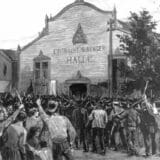
(This is the first in a three-part series about the misclassification of employees as independent contractors – a practice which affects millions of workers in the U.S., including most of the nation’s nearly 100,000 port truck drivers).
At the zenith of the Occupy movement, some commentators adopted the term “neo-feudalism” to describe the relationship between powerful corporations and the rest of society. Did this rhetoric have a basis? Yes and no. A portion of today’s workforce labors under conditions that resemble the dark era of the 19th century more than they do either the medieval or the modern one.
First, a little background. In the social and legal world of medieval England (which, for better or worse, begat our legal system), one’s employer was one’s master, landlord, and protector – and all these relationships were encased within the Church and the great chain of being.


(In today’s Los Angeles Daily News, staff writer Dakota Smith reports on one of the city’s most promising initiatives — an energy efficiency program that is saving consumers money, creating jobs and reducing our energy use. The project, a partnership between the International Brotherhood of Electrical Workers Local 18 , the union representing the utility’s workers, and the Department of Water and Power, has received strong support from RePower LA, a broad-based coalition that promotes the economic and environmental benefits of energy efficiency.)
Lorraine Cannon stretches every dollar. The 84-year-old lives off a monthly retirement check from L.A County, and she shares her Pacoima house with her granddaughter and three young great-grandchildren.
But now helping to pay the bills is an unlikely source: the Los Angeles Department of Water and Power.
Cannon’s house was picked for an energy efficiency makeover by the department,


On a day when the number of unemployed Americans ticked up to 8.3 percent, it’s worth checking out an ongoing project of Marketplace. The American Public Radio program has been inviting readers to contribute images and comments they believe capture the essence of what it means to be middle class.
“We spend a lot of time talking about the middle class,” says Marketplace. “What it is, who’s part of it, why it matters. Now it’s time for you to tell us.”
The photos range from retro black-and-whites to current digital snaps, and the contributors run the gamut from retirees to students, from the complacent to Occupiers. The contributors’ comments are often more poignant than the images. One young Virginian submitted a grim watercolor of a man carrying a sign reading, “Out of Confidence.” As the contributor explained:
“I do not consider myself middle class at the moment.
» Read more about: WebHot: Marketplace’s Middle Class Photo Project »


Hundreds of millions of tons of goods enter the United States every year through our nation’s busiest ports in Long Beach and Los Angeles. Containers are then trucked through the Los Angeles basin to the Inland Empire, San Bernardino and Riverside counties, where roughly 85,000 warehouse workers, mostly Latino, unpack and reload items onto trucks destined for retail outlets.
The explosion of “domestic outsourcing,” the aggressive practice of contracting warehousing, transportation and goods delivery to a complex hierarchy of contractors and subcontractors, has lowered the quality of jobs in Southern California and disproportionately impacted working Latinos here, many of whom move goods for Walmart and other giant retailers at these subcontracted warehouses.
That’s why Warehouse Workers United [has] launched a new Web series: “Voices/Voces from the Warehouse,” which features real workers in Walmart-contracted warehouses recounting their personal experiences and stories from the warehouse where they work.
In the first episode,
» Read more about: Warehouse Workers' Stories Heard in New Web Series »


The L.A. Times story about fish Down Under getting skin cancer could’ve been a funny, though macabre, read if the subject weren’t so sad. After noting that 15 percent of coral trout in Australia’s Great Barrier Reef are believed to have cancerous lesions on their scales, writer Jon Bardin adds, “In that regard, they resemble Australians who live on land — two in three people who live down under will be diagnosed with skin cancer before the age of 70, the highest rate in the world.”
This is serious news, though, because the takeaway goes beyond the fact that Aussies won’t be throwing coral trout on the barbie any time soon. The fishes’ affliction apparently stems from their habitat, which lies under the outer fringes of the giant Antarctic ozone hole that’s been letting in ultraviolet rays since the invention of refrigerants. These UV rays are strongly suspected of causing the trout’s melanoma – as they are of causing it in humans.
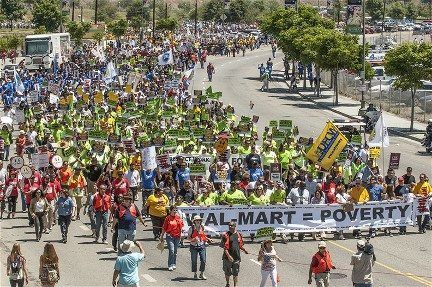

(The following post first appeared on Salon. Author Josh Eidelson discusses Girshriela Green, who was fired after speaking out against bad working conditions at Walmart during the massive June 30 march and rally held in L.A.’s Chinatown. The Los Angeles Alliance for a New Economy stands with OUR Walmart workers and actively encourages all members to call Walmart’s VP of Public Relations TODAY at 479-277-9350 to demand justice for Girshriela and her fellow workers and to reinstate her.)
As Wal-Mart celebrates its 50th anniversary this summer, it has faced a new wave of resistance from its “associates” — the company’s corporate-speak for employees. Last month, a delegation of Wal-Mart workers brought their grievances to the company’s shareholder meeting, including low wages and understaffing. In interviews yesterday, three workers at the forefront of the campaign told Salon the company has punished them for their activism. Critics say that the world’s largest private sector employer is playing dirty once again.
» Read more about: Walmart Retaliates Against Activist Workers »


In 2005, Hewlett-Packard paid Carly Fiorina $40-million if she promised not to come to work anymore. The absurd payoff followed the company’s stock plunge during Fiorina’s six-year tenure as CEO. That $40-million could have gone to staff, shareholders or new hires.
Since then, most Americans — for whom the phrase “retirement package” is a cruel joke — have watched their net worth collapse while CEO payouts have reached heights far beyond the reach of mortal men.
A study released earlier this year by GMI, a corporate-governance rating and research firm, found that the golden parachutes of just 21 CEOs collectively add up to nearly $4 billion. (That’s Carly’s massive kiss-off multiplied by 100.) You don’t want to know how rich every one of these guys — yes, they are all guys — was to begin with.
Former Penn State football coach Joe Paterno died in January after being fired for helping to cover up the systematic sexual abuse of kids under his watch.


In case you’ve missed it, the Cayman Islands have been in the news lately, and not just because it’s swimsuit season. Much of it has to do with a certain presidential candidate’s personal finances, and this, in turn, has provoked some journalistic spade work into the schematics of the “offshore economy.” In fact, just as American factories and jobs have increasingly emigrated to other countries, so have the piggy banks where some of our super-rich and/or presidential candidates place their money. Adam Davidson, of NPR’s Planet Money fame, ran a suitably scary piece in last Sunday’s New York Times Magazine in which he sketched how easy it is for just about anyone with a telephone and photo ID to set up an offshore account.
It’s a great read that begins with Davidson Googling the names of a few firms that are well versed in parking your earnings in tax-free,
» Read more about: WebHot: You Too Can Be an Offshore Tax Shirker »
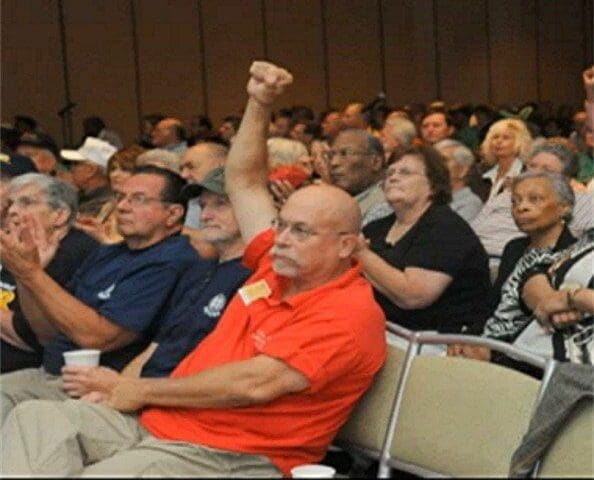

Social Security, Medicare and Medicaid are under attack by Republican lawmakers. Whether it is the Romney/Ryan budget that would end Medicare as we know it or proposals to privatize and cut Social Security, members of the Alliance for Retired Americans are pushing back and mobilizing with new “Let’s Not Be the Last Generation to Retire” campaign.
During the next few weeks to coincide with Medicare’s and Medicaid’s 47th anniversary July 30 and Social Security’s 77th on Aug. 14, Alliance members will sponsor educational briefings at senior centers and organize protests outside offices of lawmakers who have voted against the needs of local retirees. Says Alliance President Barbara Easterling:
Our goal is to educate seniors on the issues and on where elected officials and candidates stand. We need to clear up all the misinformation that is being spread by the big business groups and the right-wing commentators on TV.
» Read more about: Let’s Not Be the Last Generation to Retire »


In the last two years, since the Republican sweep in the 2010 elections, GOP-controlled legislatures in many states have passed laws requiring photo identification for voters. It is widely believed that the unspoken intent of these laws is to suppress voting by groups known to be friendly to Democrats, such as African-Americans, Latinos, poor people, and young people. In a possible miscalculation, the Republicans also make it more difficult for seniors, a group that has recently trended more Republican.
Pennsylvania, has one of the toughest photo ID laws. A person must have a photo ID, such as a valid Pennsylvania driver’s license, a valid U.S. passport, or an ID issued by a Pennsylvania higher education institution or nursing home (with an expiration date). If the potential voter has none of these, s/he can obtain a state-issued card from the Department of Transportation. To do that, one must go to one of the agencies equipped to issue such cards,
» Read more about: Voter Suppression Laws: Green Cards for Citizens? »


(Note: The following feature first appeared at Unionosity, a new local blog devoted to coverage of labor issues; we repost it with permission.)
Negotiations between workers and the Waste Management company have reached an absolute standstill, with hundreds of trash and recycling workers striking and the sanitation giant refusing to negotiate with picketing workers.
Waste Management employees, represented by Teamsters Local 117, walked off the job last Wednesday after working without a contract since May 31. Waste Management is proposing a contract that pays recycling workers less than garbage haulers, despite the similarity between the jobs. Tellingly, Waste Management has historically taken an oppositional stance to organized labor, and seemed to be priming for a lock-out in June. After the contract expired, Waste Management held a job fair for replacement (scab) workers, and increased security at its Puget Sound headquarters. Alas, the replacement workers have not managed to keep up with the overflowing garbage and recycling heaps in Puget Sound.
» Read more about: Seattle Strike: Garbage In, No Garbage Out »


(Beginning tomorrow, August 1, health insurance companies will be required to cover women’s preventive care without extra charges. As other provisions of the Affordable Care Act (ACA) continue to unfold over the next few years, more women will gain further access to affordable preventive health care. Countdown to Coverage has been marking the days leading up to August 1 with posts about how ACA – often called “Obamacare” by its opponents — will benefit women, while pointedly rebranding the act “MamaCare.”
The following reposted feature was written by Rebecca Spence, of the American Pacific Islander American Health Forum, and Marissa Spalding, of Black Women’s Health Imperative.)
We love MamaCare! Thanks to the health care law, on August 1 all new health insurance plans will have to provide pregnant women with coverage for gestational diabetes screening without charging us expensive co-pays and deductibles.


There’s a scene in Lauren Greenfield’s likable documentary, The Queen of Versailles, in which the titular monarch, the wife of time-share mogul David Siegel, announces she is shoveling $2,000 worth of caviar into her mouth. “Somebody’s gonna get fired,” grumbles her husband, a former billionaire who is now desperately pinching pennies as his creditors tighten a noose around his troubled empire.
The film is full of such jarring moments, making it partly an American economic fable, partly a reality TV show. Like many such train wrecks, the story takes place in Florida and, like many a tale of real estate rise-and-ruin, it begins on the eve of the recent recession. That’s when Greenfield set out to capture the Siegels’ construction of the largest house in America – a 90,000-square-foot monstrosity inspired by both Louis XIV’s court at Versailles and the Paris Las Vegas hotel and casino. Among other things, its floor plans called for 23 bathrooms,

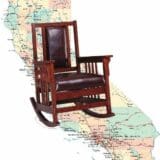
In the past decade the number of California workers with access to a retirement plan at work has plummeted. A recent study by The New School’s Schwartz Center for Economic Policy Analysis (SCEPA) shows that in 2009, 52.3 percent of California’s workers did not have access to an employer-provided retirement plan—representing a 6.5 percent rise over the previous decade in workers without pension access.
This increase poses a danger to the broader economy, which will suffer the destabilizing effects of mass retirement insecurity. Legislators can address this looming crisis with a fair, low-cost solution: opening existing, well-managed retirement systems to private sector employees.
SCEPA’s new statistics underscore the need for the California state legislature to once again take action on legislation based on my proposal. Titled The California Retirement Savings Act, the bill was introduced by State Senator Kevin DeLeon and passed the state senate in February.


(This post first appeared on California Progress Report and is reposted here with permission.)
This November, California voters will have an opportunity to vote on a simple, yet important ballot initiative called Proposition 37 – the California Right to Know Act. If approved, it would require food sold in California supermarkets be clearly labeled if it has been genetically engineered.
What many probably don’t yet know is there is no clearer David versus Goliath fight on this year’s ballot. On one side, is a truly grassroots people’s movement that generated over a million signatures in just 10 weeks, easily qualifying for the November ballot. On the other stands the largest anti-union, pro-pesticide, agrichemical interests in the world dedicated to saying and spending whatever it takes to hide the fact that some of our most important crops are being genetically engineered in a lab without our knowledge or consent.